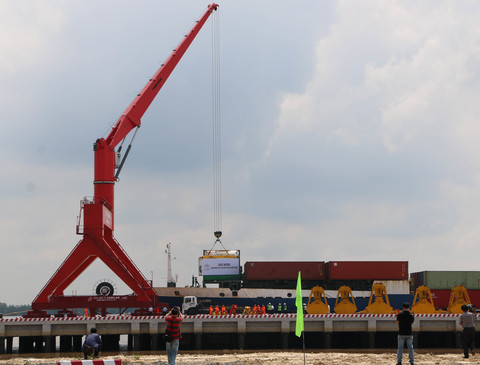
Fresh chicken is loaded for export to Japan in the Mekong Delta province of Long An. — VNA/VNS Photo Thanh Binh
The Cuu Long (Mekong) Delta Region is a highly promising economic area and proves to be quite attractive to Japanese investors, according to Umeda Kunio, the Japanese ambassador to Viet Nam.
“I think it is a very effective meeting when leaders of 13 Mekong Delta provinces and 120 Japanese enterprises come together,” Umeda said at the conference titled Meeting with Japan in Mekong River Delta in Can Tho City yesterday.
The conference was held as part of the activities to celebrate the 45th anniversary of the establishment of diplomatic ties between the two nations. It drew participation of many Japanese businesses, with a third making their first step to Viet Nam and looking for investment opportunities in the Mekong Delta Region.
“Japanese enterprises have paid more and more attention to Viet Nam, and now there are a number of Japanese enterprises in Viet Nam, more than in Thailand and the highest in Southeast Asia, with total investment of US$9.1 billion,” Umeda said.
Kanaka TetSuo, head of the Japan International Co-operation Agency in Viet Nam, said “We know about the potential of and challenges facing the Mekong Delta. I’m sure more co-operation memorandums will be signed after more discussions and Japan will increase support for human resource training, agricultural production, combating forest fires and reducing salinity.”
“Viet Nam and Japan have been comprehensive strategic partners since 2014. Japan is now number one in providing official development assistance, number two in foreign direct investment, number three in tourism and number four in trading with Viet Nam,” Deputy Minister of Foreign Affairs Bui Thanh Son said. “The meeting is a very good chance to promote co-operation between the Mekong Delta and Japan.”
Vo Thanh Thong, chairman of the Can Tho City People’s Committee, said: “In recent years many foreign investors, including Japanese, have arrived in Can Tho and other Mekong Delta localities. Can Tho authorities have recognised the demand and we annually hold information, culture, investment exchange programmes, especially with Japan, to promote investment.
“Can Tho and other Mekong River Delta localities pledge to assist Japanese investors in doing business in the region, especially in infrastructure, transport, agriculture, healthcare, climate change, tourism and economy.”
Luu Quang Khanh, head of the Foreign Economic Relations Department, said Japanese assistance to Viet Nam accounted for 30 per cent of total foreign aid, focusing on energy, transport, agriculture and rural development, urban infrastructure, ports and heath care.
“Japanese-supported projects like Bach Mai and Cho Ray hospitals and Bai Chay, Thanh Tri, Nhat Tan, Can Tho bridges … have proved their effectiveness in improving Viet Nam’s social and economic conditions,” said Khanh.
He said in the future Japanese support for Viet Nam would focus on improving economic competitiveness, promoting the private sector, using natural resources effectively, coping with the consequences of economic development and supporting administrative reform.
Japanese investments are welcome in the Mekong Delta, Truong Tan Sang, Viet Nam’s former president, has said. The Vietnamese Government would strive to boost the development of the Mekong River Delta as well as limit the impacts of climate change on the land in the future, and develop co-operation with foreign investors, especially with an important partner like Japan, is highly encouraged, he said. — VNS